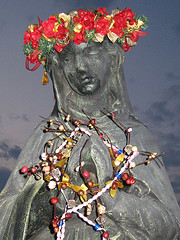 This rosary meditation focuses on the Third Sorrowful Mystery — The Crowning of Thorns. The Roman soldiers mocked Jesus by dressing Him in royal purple and crowning Him with thorns (Mk. 15:17). They then mocked Him and pretended to pay Him homage (Mk. 15:19). Would the soldiers have acted so cavalier and arrogant if they truly understood who it was they were mocking? While we are not as brazen as those soldiers, we often mock Jesus by giving lip service to our faith. Instead of faithfully following Jesus, we too often dishonor Him by putting the fleeting treasures of this life in front of the treasures waiting for us in Heaven. Particularly in this time of Lent we must make a sincere effort to put Jesus first in our lives and honor Him the way He deserves.
This rosary meditation focuses on the Third Sorrowful Mystery — The Crowning of Thorns. The Roman soldiers mocked Jesus by dressing Him in royal purple and crowning Him with thorns (Mk. 15:17). They then mocked Him and pretended to pay Him homage (Mk. 15:19). Would the soldiers have acted so cavalier and arrogant if they truly understood who it was they were mocking? While we are not as brazen as those soldiers, we often mock Jesus by giving lip service to our faith. Instead of faithfully following Jesus, we too often dishonor Him by putting the fleeting treasures of this life in front of the treasures waiting for us in Heaven. Particularly in this time of Lent we must make a sincere effort to put Jesus first in our lives and honor Him the way He deserves.
We are often very much like the Roman soldiers who pretended to pay Jesus homage. Sure, we may say that we are good Christians. We might recite prayers every night and go to Mass every Sunday. But do we truly believe that Jesus Christ is our king and savior? Will we follow Him even when times are difficult and our faith runs contrary to society’s norms? Or is our faith something done in isolation and detached from our “normal” lives? For example, how many of your beliefs conflict with the Church’s teachings? Or, when faced with a difficult situation, how often do you tell a “little white lie” or commit some other easy sin to serve your own ends? Do you go to Confession without intending to truly turn away from your sins and live with a converted heart? There are so many ways where we pretend to follow Jesus but our actions tell a different story. And while our transgressions may seem small and inconsequential, they are like the little thorns on the crown we offer to Jesus. When meditating upon this mystery think about how sincerely you praise and honor Jesus. Do you practice and live the faith you profess or are you like the Roman soldiers who only pretended to honor Jesus?
For whose kingdom are you living? We too often live for this worldly kingdom and not for Jesus’ kingdom of Heaven. There are so many things that compete for our attention — money, power, possessions, and lust just to name a few. But we must remember this verse from the Gospel of Matthew (6:24):
No one can serve two masters. Either he will hate the one and love the other, or he will be devoted to the one and despise the other. You cannot serve both God and Money.
But how we try. However, as the verse says, by trying to serve two masters we often end up serving only one. Since money and possessions are physical, quantifiable things it is often easier to live for them than it is to live for our treasures in Heaven. After all, we only have it on faith that the riches of Heaven will far outweigh anything made in this world. But since our eternal reward isn’t something advertised during the Super Bowl by a fancy advertising agency, we too often kick it aside for the things that we can see, hear, and touch.
Ask yourself in this time of Lent, what master are you serving? What type of crown do you offer Jesus Christ?
Related articles by Zemanta
- Lent Blog: 1st Sunday in Lent (mikepeat.blogspot.com)
- God Uses Unlikely People in Unlikely Places (highcallingblogs.com)
- Preparing For Lent (thisido.blogspot.com)






